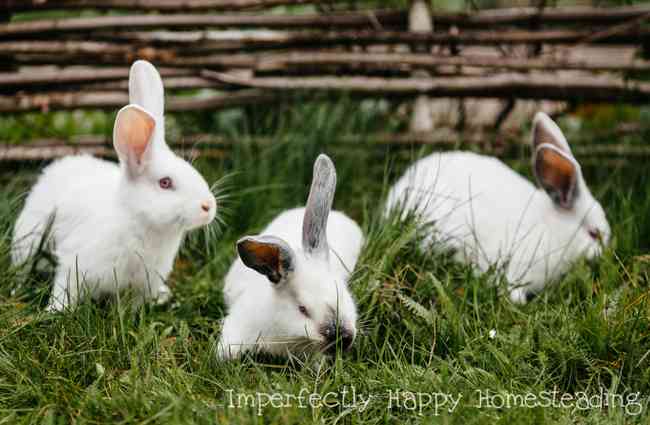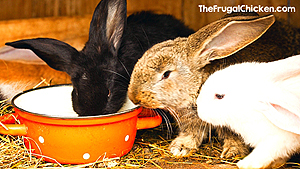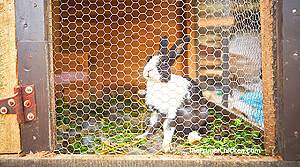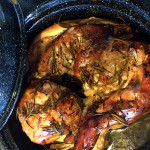 Rabbits in Colonies or Cages? That’s the question! There are pros and cons to both methods. Today I welcome Maat from Frugal Chicken – she’s going to share her personal experience in raising meat rabbits in colonies versus cages.
Rabbits in Colonies or Cages? That’s the question! There are pros and cons to both methods. Today I welcome Maat from Frugal Chicken – she’s going to share her personal experience in raising meat rabbits in colonies versus cages.
When it comes to keeping homestead rabbits, you have some choices regarding housing. Namely, you can either choose to keep your rabbits separate or you can keep them together, in colonies. Each has their advantages and disadvantages.
Rabbits in Colonies Vs Cages
On our farm, we’ve kept rabbits both in colonies and cages, and although the colonies had their advantages, we found that cages worked better for us. Safety of all our animals is paramount, from the tiniest kit on up, and through trial and error, I found that the easiest way to avoid bloody ears and missed pregnancies was by strictly controlling their environment.
Getting Started with Meat Rabbits
For full disclosure, we currently keep two does in the same large cage together who grew up together. In a separate cage, we keep two bucks who also grew up together, but still find keeping the remaining rabbits in separate living quarters is advantageous.
Over the winter, we are rebuilding housing for them so these two pairs of rabbits can have individual homes.
While colonies let your rabbits live similar to their natural lives out in the wild, there are some disadvantages. Rabbits have social hierarchies and does, can especially, be territorial.
When we kept our rabbits in colonies, we frequently had issues with one doe bullying another doe, who then felt her only survival option was to hide. That same doe then did not have access to food and water easily, and removing her from the colony for her health became necessary.
Between rabbits that got along, there were still consistently jousts to determine who was boss. Our rabbits that grew up together get along for the most part, but confrontations over dominance still happen, although there are no issues with biting or anything serious.
When we kept rabbits in colonies, we also were not able to control breeding or adequately know when a doe was expected to give birth, and this is probably one of the biggest disadvantages of colonies. A Doe will give birth anywhere from day 27 – day 31 or 32 of their gestation cycle. Without knowing the exact date of conception, we couldn’t determine when to offer a sanitized nesting box (rabbits will pee and poop in nesting boxes if they’re left in there indefinitely, so we try to clean them between kindling).
This led to many missed opportunities to provide adequate nests, especially in cooler weather, and resulted in dead kits. Even when we provided extra hay to keep them warm, some of the does weren’t able to get enough hay or be left alone long enough to pull fur to create a warm, safe nest.
Top 10 Meat Rabbits
As I’ve said, does can be very territorial, and will guard their territories jealously. In one memorable instance, we had a doe, a dominant doe, attack the kits of another, less dominant rabbit.
 In addition, we could not keep accurate records of which buck bred which doe (since we have several bucks), and therefore couldn’t create a successful breeding program that could be replicated. This is a big disadvantage to a homestead with an aim to be self-sufficient – what if breeding two rabbits led to superior kits? Wouldn’t you want to replicate that? Or, on the other hand, what if breeding one doe to a buck resulted in poor quality kits that were small and sickly? Wouldn’t you want to know, so you don’t attempt that cross again?
In addition, we could not keep accurate records of which buck bred which doe (since we have several bucks), and therefore couldn’t create a successful breeding program that could be replicated. This is a big disadvantage to a homestead with an aim to be self-sufficient – what if breeding two rabbits led to superior kits? Wouldn’t you want to replicate that? Or, on the other hand, what if breeding one doe to a buck resulted in poor quality kits that were small and sickly? Wouldn’t you want to know, so you don’t attempt that cross again?
Lastly, when it came to feeding rabbits in colonies, it was something of a drama. We had bowls for each rabbit, but we often had fights break out over food, particularly with our does. We had a hard time determining if each doe was getting the right amount of food.
On the other hand, there are many advantages to keeping your rabbits in colonies. Usually, they have more space to roam, and can interact with other rabbits as they would in the wild. I know several homesteaders who keep their rabbits in colonies successfully, so it’s always something to keep in mind when you start your journey caring for homestead rabbits.
On our farm, we keep the majority of our rabbits in separate cages, but close enough that they can see each other, talk to each other, and touch each other on a very limited basis. We’re better able to control their environment, know each rabbit is getting the right amount of food and water, and that everyone is
While there are advantages to keeping rabbits in colonies, I personally prefer keeping them in separate cages. I think it keeps everyone healthy, with fewer birthing issues. If you would like to learn more about raising homestead rabbits, you can visit my blog FrugalChicken. You can also download a free cheat sheet “10 Tips To Raising Rabbits On A Small Homestead” right here.
Never miss a post ~ Sign up for the Imperfectly Happy Newsletter




